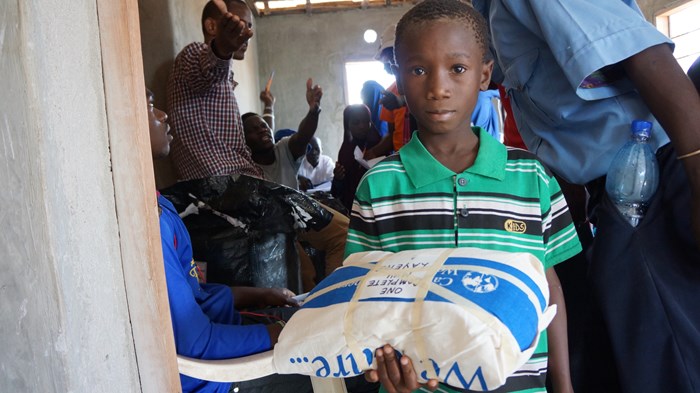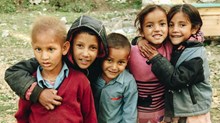Refugee Resettlement Changes Lives

No one is a statistic; Every refugee is a unique human being with a story. I do not usually talk about my past. I prefer to forget the thirty-one years of my life that I lived without hope in Africa. But in America today, where refugee policy is a contentious political issue, it’s only by sharing stories like mine that people can see why refugee resettlement matters and why we can’t afford to compromise on the value of welcoming refugees with open arms. This is my story.
Like many refugees, my narrative begins with the heartbreaking decision to leave home. It was 1996, and the war had just broken out. The Democratic Republic of the Congo had always been my home, but the war was brutal and bloody. It became too dangerous to stay in the country. My family and I made the difficult choice to flee.
As you can imagine, life as a refugee wasn’t easy. For the next nineteen years, we lived in one Tanzanian refugee camp after another. When one camp closed, we packed up and moved to another. It wasn’t perfect, but it was a life away from the war, away from the violence, and away from almost certain death.
Yet being a refugee brings its own risks and vulnerabilities. On one night in 2012, I was attacked by criminals at my home. I was lucky; nearby police officers were able to save me from harm. But my assailants escaped. Before fleeing, they told me that they would kill me. They told me that they had to “terminate my life.” I was never given a reason why. Ever since that night, I lived in constant fear. I couldn’t sleep. Many nights I would go to bed wondering if I would wake up in the morning.
Here is where refugee resettlement changed everything for the better. Had it not been for the refugee support systems in place, my family and I would never have been able to live free of the fear that had gripped us. Thanks to United Nations refugee services, we were given the opportunity to resettle to the United States in 2015.
But relocation was only the first step of a long journey.
Life in the U.S. was safer, freer and happier than our life as refugees, but it was also more difficult than I had ever expected it would be.
My family and I had only ever lived a rural life in Africa. This means that we had never rented a house, paid a monthly bill or applied for medical benefits. The realities and responsibilities of American life confused me. I often wondered if I was simply destined to become homeless and destitute. I worried daily how I would survive. On top of that, the trauma from the criminal attack on my life in 2012 still caused me great anxiety and pain; when I slept, I dreamt of someone breaking into our new apartment and killing us.
And the culture was so new and bewildering, too. During the week leading up to my first Fourth of July, I mistook the sounds of fireworks going off at night for bullets. It wasn’t until I was able to speak with my case worker the following morning, and hear her explanation, that I was able to breathe a sigh of relief.
But here again, it was the intervention of kind, caring and compassionate refugee resettlement workers who made all the difference. With the help of the great staff at World Relief’s Aurora office, my family and I slowly built a new life here. At first, we survived on less than twenty dollars a week. But thanks to the case managers and employment counselors at World Relief, my family and I continued to work and learn and acquire new skills. We began to feel at home in the U.S. In fact, we began to truly be at home in the U.S.
Ultimately, I loved World Relief so much that I applied for a job working there. My life had been so dramatically changed for the better that I felt called by God to give something back. And while I was scared and nervous to start on such important work, I’ve since settled into my new role as a family support coordinator at the World Relief Aurora office. I love working at World Relief, because I know that refugee resettlement services change lives. When I do my job, I am helping God’s children. When my service brings a smile to their face, I am happy.
Back in Africa, I lived a life without goals. But now I have many goals. I have hope and dreams and plans for the future! I go to bed every night feeling safe, and I wake up in the morning without fear.
I never thought I would be living the life I live. Sometimes I wonder what my life would be like if no one had come to my aid. I still do not know the answer. But I do know that supporters of refugee resettlement and organizations like World Relief empower millions of families like mine to hope for a better future. I have nothing to give that can show how important the love and kindness I have received truly is. My gratitude is endless. And the millions like me are grateful too.
Jerome Bizimana is a refugee from the Democratic Republic of the Congo. He is currently a family support coordinator at World Relief Chicagoland.
The Humanitarian Disaster Institute has created a Spiritual First Aid manual for U.S. church leaders and lay helpers serving refugees. Download it for free here.
The Better Samaritan is a part of CT's
Blog Forum. Support the work of CT.
Subscribe and get one year free.
The views of the blogger do not necessarily reflect those of Christianity Today.





















